3. THE ANCIENT JEWISH LEGACY

THE ISRAELITES STRUGGLE TO "KEEP COVENANT" WITH GOD
From the 1900s B.C.(?)
to the Time of Christ
CONTENTS
 Israel as the "Light to the Nations" Israel as the "Light to the Nations"
 The early foundations of the Covenant People The early foundations of the Covenant People
 The Davidic kingdom The Davidic kingdom
 Division ... and decline Division ... and decline
 The "Babylonian Captivity" ... and its legacy The "Babylonian Captivity" ... and its legacy
 Further developments in Judea Further developments in Judea
The textual material on this webpage is drawn directly from my work
A Moral History of Western Society © 2024, Volume One, pages 108-127.
|
A Timeline of Major Events during this period
Note: The period prior to David's kingdom in 1000 BC is highly speculative
BC
1900-1800? The approximate time of Abraham
1700? The migration of the Israelites during Joseph's premiership in Egypt
1390? The birth of Moses ... his death 120 years later in 1270 BC
1310? The massive Exodus of Hebrews or Israelies from bondage in Egypt
1270? The Hebrews or Israelites enter the Promised Land under Joshua's leadership
1000 The Israelites come under the kingship of David
970 Solomon takes up the Davidic kingship (970-930 BC)
967 Solomon's temple is built in Jerusalem
930 Israel is divided: the northern portion (Israel) under General Jeroboam; the southern portion (Judah) under Rehoboam
873 Jehoshaphat comes to power (873-849 BC) in the southern kingdom of Judah
871 Ahab comes to power (871-852 BC) in the northern kingdom of Israel
867 Elijah challenges (and kills) Jezebel's prophets of Baal (Jezebel, wife of Ahab)
850 Elisha takes over as prophet (850-830 BC) with Elijah's being ushered into heaven
849 Jehoram comes to reign in Judah (849-842 BC) ... bringing catastrophe to Judah
843 Elisha has military commander Jehu kill Jezebel, her son Jehoram, and their family
Jezebel's daughter Athaliah (wife of Jehoram) murders nearly all of the
Davidic line in Judah; only the child Jehoash survives (hidden)
836 With Athaliah's murder, young Jehoash comes to power (836-796 BC), giving Judah 40 years of good government
732 Judah's king Ahaz (736-716 BC) tragically asks Assyrian ruler Tiglath-Pileser III to help
him ward off Israel and Syria ... giving the Assyrians the excuse to
conquer Israel
727 Assyria is furious when Israel then asks Egypt for help, crushes Israel (727-724 BC), and scatters the defeated Israelite population
across their empire ... disappearing Israel
701 Assyrian king Sennacherib forces Judah's king Hezekiah (715-686 BC) to pay tribute
But the prophet Isaiah promises Hezekiah that YHWH (God) will deal with
Assyria
681 Sennacherib is killed by his sons, who base their power to the south at Babylon
626 Babylon breaks free from Assyria ... Babylon now becoming a great power
597 But Judah now gets caught up in the politics of contending powers Egypt and Babylon
and Judah's king Jeconiah and his nobility are marched off in captivity
to Babylon
587 And Judah's king Zedekiah (597-587 BC) ignores Jeremiah's warning not to play politics ... and he
and some 20,000 Jews are also marched off to Babylon ... except that
they are
allowed to live there in community ... thus preserving their Jewish
identity
500s Thus begins the assembly of the Jewish Scriptures ... as a Jewish social identifier
539 Persian king Cyrus defeats Babylon ... allowing Jews to return to Judah. Most stay ... but many (40,000?) return under the leadership of Zerubbabel (grandson of Jeconiah)
535 The rebuilding of the temple begins with the financial support of Persian king Darius, and under the local leadership of Zerubbabel
530 But the rebuilding stops when the local Samaritans move to block the effort
521 At the urging of Haggai and Zechariah, the rebuilding of the temple resumes
516 The rebuilding of the temple is complete ... and it is rededicated
445 Artaxerxes authorizes Nehemiah to rebuild Jerusalem's walls (which go up quickly)
The prophet Ezra works with Nehemiah in securing Jewish religious
orthodoxy
333 Alexander and his army bring Judah under Greek (ultimately Seleucid) authority
168 An insane Greek ruler, Antiochus Epiphanese, grows angry over a political appointment and
slaughters Jerusalem and its inhabitants ... and forces Jews to
sacrifice to him
167 Mattathias and his sons spark a Jewish revolt ... but are forced into the mountains
164 Mattathia's son Judah "Maccabee" (the Hammer) leads a group that takes Jerusalem ...
spreading an anti-Seleucid revolt across the land ... aimed also at
Hellenized Jews
160 The Seleucids retake Jerusalem (Judah killed in the process) ... but Judah's brother
Jonathan
takes advantage of Seleucid divisions then to retake Jerusalem
153 Comprise results with the Seleucid appointment of Jonathan as Jewish High Priest
143 But Jonathan is killed in a clever Seleucid plot... with brother Simon then taking the lead
141 A Jewish Council recognizes Simon and his Hasmonean family as rightful rulers
139 Rome, now in control, confirms the appointment
134 Simon is killed at a feast, the family killed off, except son John "Hyrcanus," who was not present
at the event; he thus takes over Hasmonean leadership (as High Priest)
John
also as a conqueror expands the Jewish kingdom considerably (134-104 BC)
104 John dies... and rule soon (103 BC) comes to his second son, pro-Sadducee and
pro-Seleucid Alexander Jannaeus ... and his quietly pro-Pharisee wife
Salome
99 In reaction to Alexander, a bloody six-year civil war (99-93 BC) breaks out between the
conservative Pharisee Party and the more Liberal (and pro-Greek)
Sadducee Party
76 Alexander dies, Salome continues to rule ... bringing some peace to Judah (76-67 BC)
67 With Salome's death, civil war breaks out again ... Roman General Pompey intervenes, crushes
Jerusalem, and ends the Hasmonean monarchy... then returns to Rome
47 Edomite governor Antipater is given rule as procurator of Judea by Julius Caesar
37 After much war and political intrigue, Antipater's son Herod becomes Judean King
(37-3 BC) ... rebuilding Jerusalem and its temple ... using heavy taxes
to do so
ISRAEL AS A "LIGHT TO THE NATIONS" |
|
How Ancient Israel inspired the development of young America
The Framers of the American Constitution (1787).
Undoubtedly in their look back in history to find guidance in shaping
their new American government, the Founding Fathers of the young and
rising American nation – one that had come to view itself as being
specially covenanted by God to be a "City on a Hill" or a "Light to the
Nations" – were also quite knowledgeable about ancient Israel. It
was, after all, the forerunner and major part of the spiritual
foundation on which their own Christian faiths stood.
They
had just gone through a grueling struggle to preserve their political
independence from Britain and its king and armies, who materially
speaking were far better equipped to win this engagement than were the
simple American colonists. But these Americans were mystics, and
knew full well that it was God ("Providence") that had given them the
win in this struggle – just as it was God who had been their protector
and guide in founding and building this covenant nation a century and a
half previously. Now (the summer of 1787) they were called to put
this venture into writing – a fundamental or constitutional law that
would carefully define how a newly independent America was at that
point to be governed.
But
getting the 55 delegates to be "reasonable" in developing a relatively
short document defining their ongoing union as the United States of
America proved to be a very difficult task. They all had their
own good ideas of how this should be done. And with half of them
being experienced lawyers, all the careful legal reasoning they
employed to get their own views accepted was getting them nowhere …
except into ever-deeper contention.
Thus
at a point that the convention seemed doomed to failure, the American
sage, Ben Franklin, called on the delegates to stop their contentious
self-serving political reasoning and instead go to God in prayer – in
fact begin each day in prayer in order to get God's counsel in this
enterprise of theirs. He quoted the Biblical passage, "Except the
Lord build the House, they labor in vain that build it" (Psalm
127:1). He warned them that not to look to God in this matter was
clearly going to result in failure in their efforts, and possibly the
discouraging of any other society from ever attempting to establish a
government on human wisdom, and instead leave it to chance, war and
conquest. And that admonition seemed to have sobered them enough
to back off from their high reasoning … and find ways to work together
– through much compromise of course. ("enlightened" idealists hate the
very idea of compromise).
Fortunately,
besides their own long experience (a century-and-a-half) of self-rule,
they also had in front of them (as Franklin clearly demonstrated) the
clear example of Israel itself as the very model of what a society that
had been covenanted to God was to look like, how under the rule of
God's Laws it was to operate … and not operate. So it was that
Biblical Judaism was very instructive on just such matters that these
Framers of a new American Constitution themselves were facing.
The Puritan-American legacy.
That very moral-spiritual foundation that the Constitutional Framers
themselves enjoyed was well laid out in America because of a large
number of English Puritans who came to America a century and a half
earlier (the early 1600s). These Puritans were very much into the
laws of God ... ones they knew well on the basis of personal experience
to be the most reliable instruction set to live by in both their
personal and their social affairs. And these Puritans lived by
means of a huge faith that gave them the necessary confidence to move
boldly into a previously unexplored world. Thus it was that by
all instinct they were great explorers … even adventurers.
Indeed,
the Puritans were well-known in their days for how they were the most
active in studying carefully the world that seemed to be opening around
them … looking for the patterns in all of life, in all of Creation,
that God himself had put in place. Thus not only were the
Puritans major experimenters in their days in the fields of math,
physics and chemistry (for instance, England's Royal Society, founded
in the 1600s, was filled with numerous Puritan "natural philosophers"
or scientists), they were also social visionaries, attempting to develop a society
founded on God's very Word itself.
They
were thus excited to put into place in the new American setting the
life patterns that they knew that God himself had set up at the very
foundations of the world, of the universe itself – patterns or "natural
laws" not only to be discovered in their scientific research, but also,
and most importantly, already well-founded on God's very Word – laid
out quite clearly in their Bibles..
Ancient Israel and the laws of God. Thus
it was that ancient Israel was well understood in America to be God's
"Light to the Nations," revealing to all the peoples, all the nations,
how God's social laws worked – have always worked and will always work
accordingly – because social experiments, unlike physics and chemistry
experiments, do not fit the strict requirements of laboratory
experimentation. You can't conduct social experiments with whole
societies the way you can conduct laboratory experiments with objects
of a more physical nature!
Understanding
this, and due to the enormous complexity of the laws directing all
social dynamics – especially those concerning the rise and fall of
societies – God simply demonstrated through the "Israelite experiment"
the all-important laws of society as he made them. God made them
very explicit not only through social example, bad and good, but also
through words given directly to Israel by way of the prophets.
God intended for all of this social dynamic to be studied ... and
learned from. And indeed that was a set of lessons that the
Founding Fathers would have known in great detail. And as they
themselves affirmed, that was what enabled them to get all the human
politics that arise when deep social challenges face a people.
Putting themselves under God's guidance rather than their own
self-serving political instincts, they were able finally to make the
right decisions in founding America's new Constitutional Republic. |
THE EARLY FOUNDATIONS OF THE COVENANT PEOPLE |
It
is very hard to know where to start the Jewish narrative. Judaism
as a mature religion really came into being only with the captivity of
the Jewish ruling classes in Babylon during the 500s BC … when, with no
Temple to worship at where they could perform the anciently required
sacrifices, and thus with their priests unemployed during their
Babylonian captivity, the Jews found that to survive they had to
reinvent themselves … in the process becoming something of a "People of
the Book" (as Muslims would later term them) … that is a people whose
religious life now turned around their own well-recorded narrative as a
"chosen people" of God … now disciplined and led not by priests but by
teacher-preachers or Biblical scholars knows as rabbis – well familiar
with that narrative, and on that basis able to give skillful
moral-spiritual guidance to the various – and often quite scattered –
Jewish communities under their leadership. Thus the 500s BC
certainly would be a good place to start the narrative.
But the Jews did not just happen into existence at that point.
Rather, they were one of the tribal components (over the long run
however, the most important tribal component) of the multi-tribal
Israelite people or kingdom. And that kingdom got its start some 500
years earlier (c. 1000 BC) under Saul, his competitor David, and
David's famous son, Solomon. So, starting up the narrative with
the all-important founding of the Davidic monarchy around 1000 BC would
be a good starting point.
But here too, the Kingdom of Israel had its origins centuries earlier …
as a Hebrew people who were led out of Egyptian captivity by the
prophet Moses … to establish for themselves in the "Promised Land" a
society where they were to live, worship, and prosper under their god
YHWH / Yahweh (and have no other gods before him) … against the
neighboring tribes that they constantly found themselves up against,
and thus having to call on Yahweh constantly to come to their
rescue. That took a lot of faith in Yahweh – a faith which
constantly strengthened and then waivered – as a critical lesson in the
dynamics of faith put before the Israelite/Jewish generations to
follow. Thus starting with Moses and the early Israelites would
be a good place to start.
But Moses was himself of a line of Hebrews descending from much earlier
patriarchs, Abraham and his offspring – four generations of earlier
Hebrews well-known to Abraham's descendants, a family which originated
the idea that they were to live in accordance with a very precise
"covenant" that Abraham had taken up with Yahweh centuries earlier. So
we could start our narrative there.
But the Biblical narrative that served as the Jewish national narrative
actually started even before Abraham … going all the way back to a
primal couple, Adam and Eve, and their sons Cain and Abel. Thus
we could go all the way back to the "beginning" – the "Genesis" or
opening chapters of Jewish scripture!
So … just to keep things simple, we will go chronologically, starting
with the Genesis account … then bringing us up step by step even to
Roman times. It's a very long story. So this will have to
be presented in very summary form!
The Genesis account
The Jewish Bible begins with God's creation of the universe, and then
the bringing to life of Adam or "Earthman" (from the Jewish Adamah, or
"earth") and his wife Eve (from the Jewish Chava or "life"). They
lived in full trust in God's providence … until they were lured by the
serpent (representing Satan or the Adversary) into eating of the
forbidden fruit of the knowledge of good and evil. The misleading
promise was that this would put God's powers in their own hands … so
that God would no longer be needed. They could live by their own
godly powers. Of course, this was a disastrous deception (one
that lives on even today!).
This kind of self-serving intellectual-moral power then carries on
into their rather "neolithic" offspring, Cain and Abel … in which the
farmer Cain jealously puts to death his herdsman brother Abel … and
then plays "lawyer" before God, trying to justify this horrible
deed. He suffers the natural consequences of his action … but
oddly enough still enjoys God's loving protection nonetheless.
But wickedness merely spreads across the human landscape, especially
with the rise of urban Babel (Babylon?) … until God gets fed up with
the whole thing and decides to destroy his human creation – with the
exception of the faithful Noah and his family … and progenitors of a
new animal kingdom … who, by Noah building a massive boat (in the
desert no less) survives when God sends a massive flood lasting "40
days" (meaning a very long time) to finish the job!
Then there is Job (not part of the Book of Genesis but part of the very
ancient narrative), whose full faith in God is put to the test by Satan
… and in the face of crushing tragedy after tragedy (even his wife
urges him to give up on God) Job holds on to his faith in God … and in
the end is rewarded for keeping faith in midst of the turmoil and
terror.
Abraham and the Covenant with God
The narrative focusing on the people of "Israel" themselves actually
begins many generations later. It takes up with the ever-faithful
Abram, a man of faith who follows God's command to migrate to a new
land – one that God promises him and his descendants. No one is
exactly sure of the time, but a fair guess is anywhere from 1900 BC to
1500 BC. Abram was a nomadic Hebrew tribal elder or chief who, in
following God's instructions, moved his family and herds around the
Middle East … migrating from the lower reaches of the Tigris-Euphrates
River (in modern-day Iraq) upriver along probably the Euphrates River
and arriving at Syria. Here he then had a call from God to take
his people further south along the highlands … into the "Promised Land"
(modern Palestine).
Abram is a man who exemplified all the virtues of a "Man of God" … yet
experienced all the personal weaknesses that humans have to contend
with. In many ways he is a typical herdsman facing problems of
plenty and scarcity … which at one point has him turning to Egypt for
relief … where there, to advance his position, he presents his wife
Sarai as his sister to Egypt's Pharaoh … having then to return to the
Promised Land when the deception becomes known by the Pharaoh.
But mostly he was a "great man" because of his total submission to the
will of God. As a 99-year-old man, he covenanted with God
Almighty to be his faithful servant … just as Elohim/El Shaddai/Yahweh was to be his faithful God.1
From this point on Abram was finally to be known as Abraham (father of
many people) … a strange irony since at this point, Abraham and his
wife were very, very old. But this new dispensation also led
Sarai to becoming Sarah (from a "striving" or "contentious" woman … to
now a "princess"). To make Abraham’s faith stand out even more
starkly, they then most miraculously had a son … named Isaac (Yitzhak –
"he will laugh") – because they both "laughed" when they were told that
Sarah, at her old age (90), would have a son.
But then Abraham's faith is tested deeply when he comes under divine
call to perform the sacrifice of his son Isaac. Seeing that
Abraham is willing to do even this in service to God, God calls off the
event. Abraham has passed the test.
The "many" offspring promised by God develops slowly over the
generations, Isaac having only two sons, the twins Esau and Jacob – the
latter having to live the life of a trickster since he was by mere
minutes second-born. But clearly God's favor falls to Jacob … and
through numerous trials and errors Jacob is brought to success in the
Promised Land. In the trip back from his stay in Mesopotamia, he
encounters an angel of the Lord – and the two wrestle all night, with
Jacob finally able to win the match … and gain the label "Israel" – "he
who struggles with God." Ultimately, Jacob – or "Israel" – is
able to father a dozen male offspring (and a daughter) by way of his
four wives.
But it is the young Joseph who shines among his older brothers – to
their great jealousy. Joseph is spared his life by his angry
brothers who instead sell him to a slaver heading to Egypt. But in
Egypt Joseph shows himself to be a man of integrity, wisdom and
mystical insight … saving himself and ultimately all of Egypt from
disaster with his prophetic power, which brings him from prison to
Egyptian chancellorship … but also brings him into reunion with his
brothers who have had to come to Egypt to the find the food that is
lacking across a hungry Middle East. But the reunion is graceful
… and brings Joseph's brothers and his father Jacob and family to Egypt
to live – where they will do so over the many generations to follow.
Moses and the return to the Promised Land
Centuries would go by, and the descendants of Jacob and Joseph would
lose their special status in Egypt, even becoming bondsmen or slaves
under the Egyptian system. But these "Hebrews"2
have become a nuisance in the eyes of Pharaoh, and he orders the
slaughter of all Hebrew babies in Egypt. But the baby Moses is
hidden in the bulrushes by his sister, is discovered by the Egyptian
princess, and is brought to the Egyptian court, and raised as a
nobleman … though his Hebrew origins come to haunt him. One day
he finds himself acting on this understanding when he kills an Egyptian
overseer beating a Hebrew worker. He now flees Egyptian justice …
into the Sinai wilderness or desert … where he believes that his role
in life is to live it out as a lowly shepherd.
It is at this point (as Moses finally reached his 80th year) that God
appears to Moses in a burning bush, and orders the reluctant Moses to
return to Egypt and demand of the Pharaoh to "let his people go."
This he does … which runs into a most resistant Pharaoh … and Pharaoh's
priests who engage Moses in a dual to prove which of the two, Moses's
or the priests' gods are the more powerful. Even though YHWH
proves himself as the most powerful god of all, the tests continue …
until finally God simply calls on Moses to have his Hebrews paint their
doorposts with blood so that an angel of death that God is sending to
Egypt will pass over (thus the most important Jewish holiday, the
Passover) their homes – and strike dead the firstborn males of the rest
of the Egyptian population … including the son of Pharaoh.
This finally breaks Pharaoh's resolve and he orders the Hebrews to be
released to return to their lands in the East … then foolishly changes
him mind and has his army chase after them, only to have that army
destroyed when the waters of the Red Sea, that God has held back so
that the Hebrews can exit Egypt, are released upon the Egyptians, and
they are all drowned.
But the question of Moses's faith touching deeply the hearts of the
Hebrews he is leading now becomes of paramount importance. Food
and water are scarce and the trek is long. And, at one point, God
calls Moses to the heights of Mount Sinai – there to outline the laws
that he expects his newly freed Hebrews to live by. But on his
return down the mountain after an absence of "40 days,"3
Moses discovers that the people have set up their own "Golden Calf" to
worship … and in his fury smashes the stone tablets containing the
all-important Ten Commandments. But Moses convinces God to give
his people a second change … which he does – despite all their moaning
and complaining about their situation – claiming that slavery back in
Egypt was not this bad.
When upon finally reaching the border leading into the Promised Land
(or Canaan), God calls for a single person from each of the twelve
tribes to be sent as scouts into the land, take careful note of what
they discovered, and then report back to the people. This they
did …with ten of the twelve going on about how impossible the idea of
entering Canaan happened to be, the Hebrews merely tiny creatures in
comparison to these Canaanite giants. Once again, this set up
wailing and bitter complaining by the Hebrews about the dangers of
entering the Promised Land. But Joshua4
and Caleb, two of the scouts, affirmed that the reports of the nature
of the Canaanites were correct. But given that God himself had
promised that land to the Hebrews, they were standing with the idea of
entering the Promised Land … and taking on whatever challenges they
faced, because God would be with them. But those two could not convince
the rest of the Hebrews. As a result, God gave up on them,
promising that only Joshua and Caleb would finally enter the promised
land. Thus the complaining Hebrews found themselves stuck there …
for another "forty years" … until the youngest of the Hebrews had grown
into maturity and the older, faithless generation had died off.
At this point, with Moses also dead, under the leadership of Joshua,
the Hebrews or Israelites finally made their entry into the Promised
Land. This was the time (several centuries in duration) that the
Israelites found themselves fighting the surrounding tribes,
Canaanites, Hittites, Jebusites, Amorites, Philistines, etc. – when
they weren't coming up against each other. And in all of this,
there was always the test as to whose will they would follow, that of
their God Yahweh … or would they most humanly and most foolishly "walk
in their own counsel" – the former bringing dazzling success, the
latter bringing shameful defeat.
Thus Joshua brought down the walls of enemy Jericho by following God's
strict orders, Gideon and his small band of warriors produced the
destruction of the entire Midianite army, Sampson, though badly wounded
and blinded by his Philistine enemies, was able to break from his
capture, destroy the Philistine temple to their god Dagon, and bring
down 1000 Philistine warriors in his own ultimate battle.
And these events would strengthen greatly the faith in Yahweh and
consequent strength of Israel … only to be followed a few generations
later by the foolishness of Israelite successors who knew little of
such powerful faith. And the results for Israel would always be tragic
… until God appointed yet another judge (such as also Ehud, Deborah,
Jephthah) to once again deliver Israel from its self-inflicted
catastrophe!
1All
three names in reference to God – Elohim, El Shaddai, and Yahweh –
appear in the first few verses of Genesis 17, describing the making of
this covenant between God and Abraham.
2Hebrew:
A term indicating "those who came from beyond the river" implying
nomadic origins … and, in any case in Egypt, alien status because of
not being originally from Egypt. But it also has in the Biblical
narrative the idea of those who have passed through baptismal waters
from an old world, old life, to a new one … a covenanted one.
This would have very strong symbolic value in Judeo-Christian
spirituality.
3Clearly
40 days or 40 years – the number or figure 40 used very frequently (157
times?) in the Bible – simply means enough time for God to do what he
needed to do in a particular matter. Thus it rained 40 days and
40 nights during Noah's flood. Jesus was in the wilderness for 40
days. Moses's life was broken into three 40-year periods ... etc.
4"Joshua" (actually in Hebrew: Yehoshua, but also in Greek, Jesus) probably meaning "YHWH saves," or "YHWH is Lord/Savior."
|
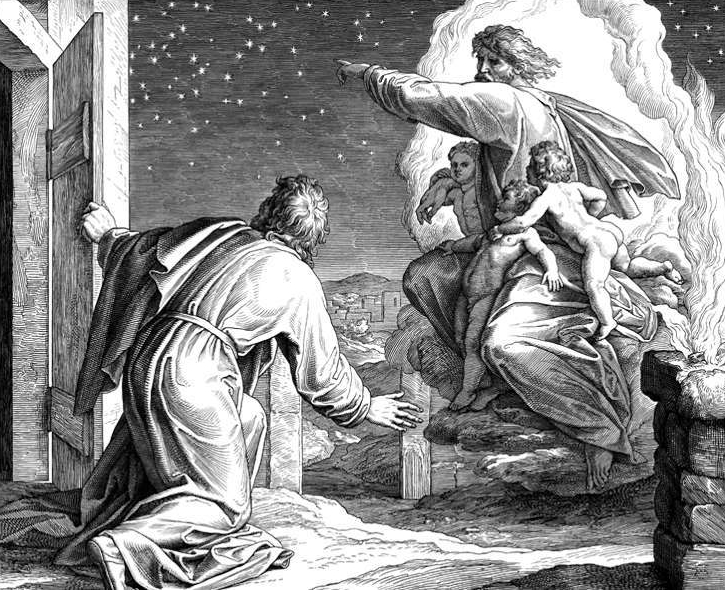
God showing the fatherless Abraham that one day his offspring will be as numerous as the stars in the sky
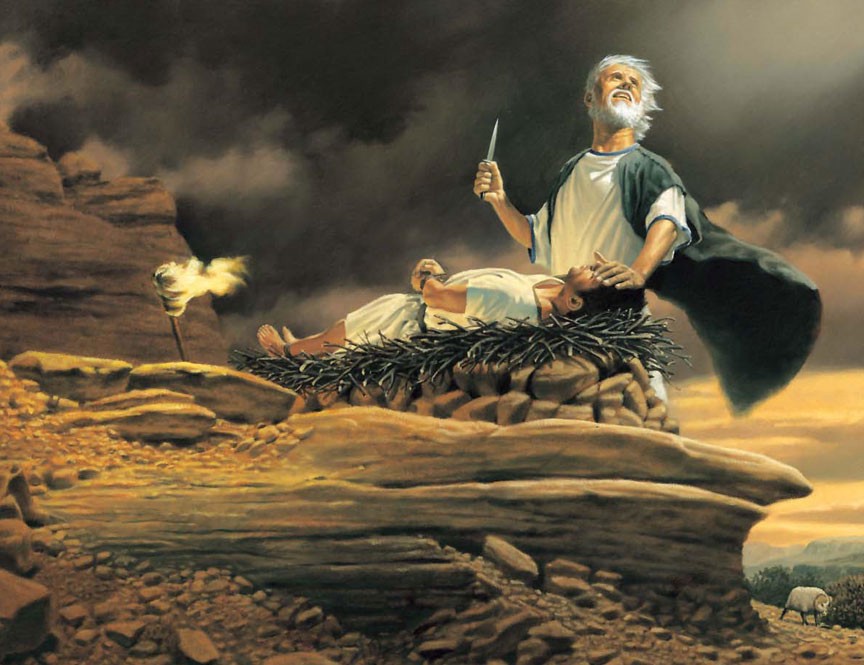
God stopping Abraham from offering his only son Isaac in sacrifice to God
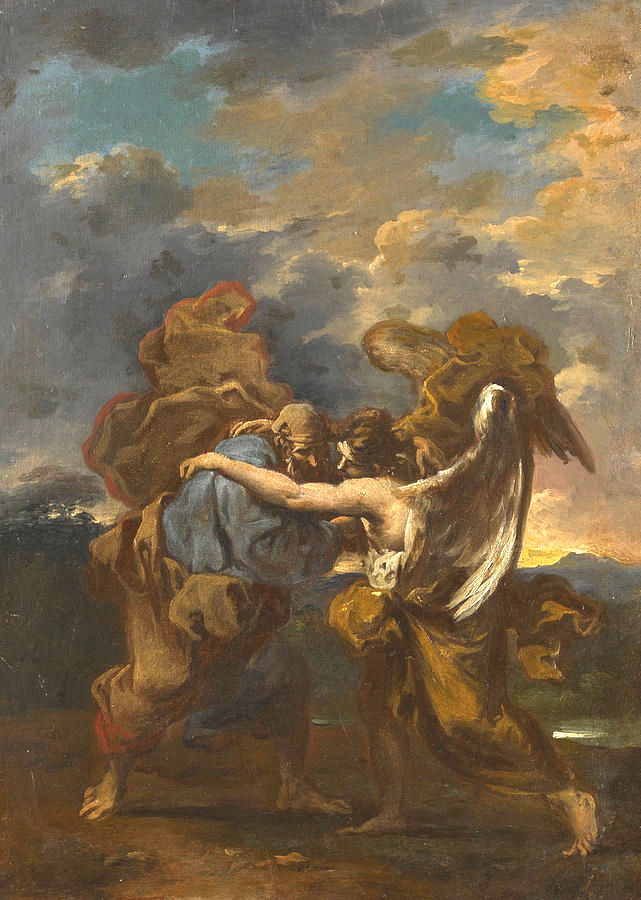
Jacob wrestling with God's angel ... thus becoming "Israel" ("struggles with God")
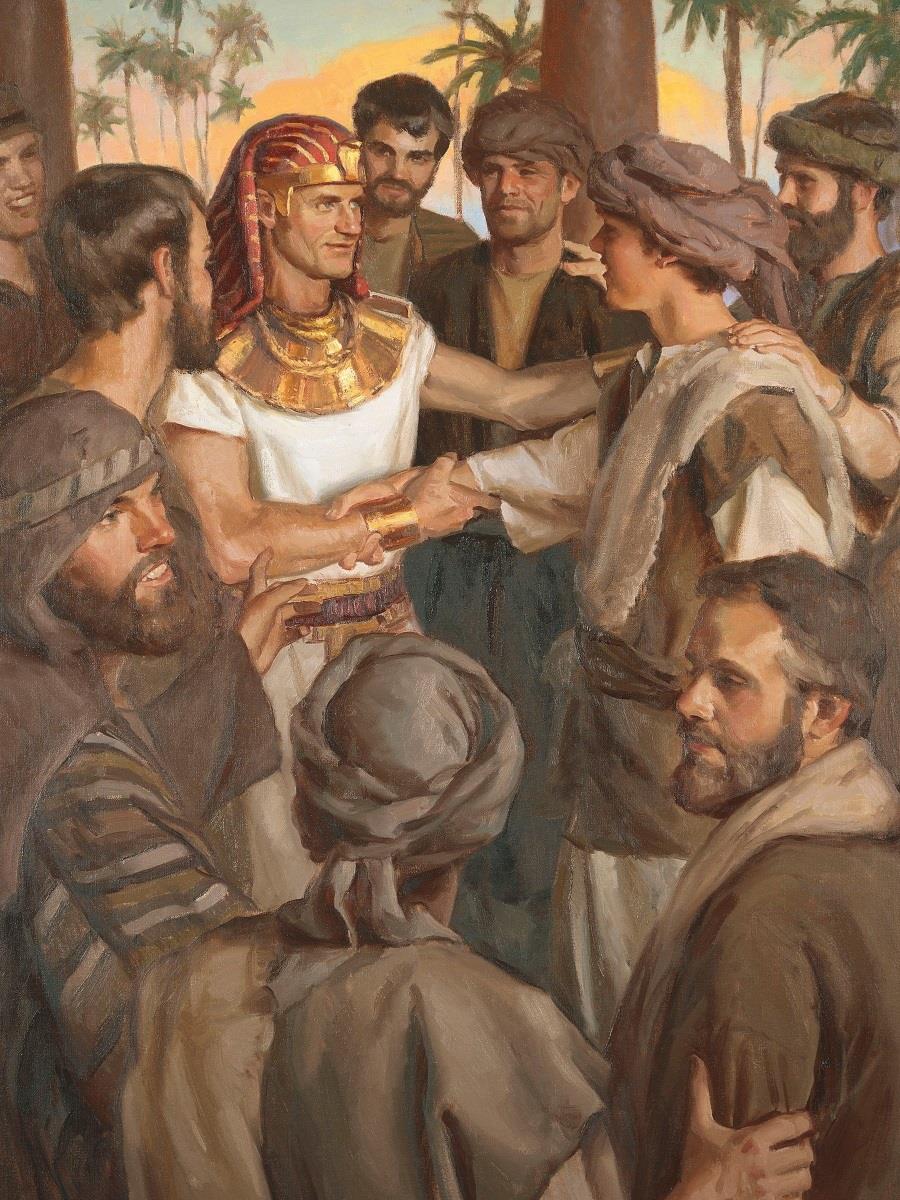
Joseph, now as an Egyptian leader, reunites with his brothers
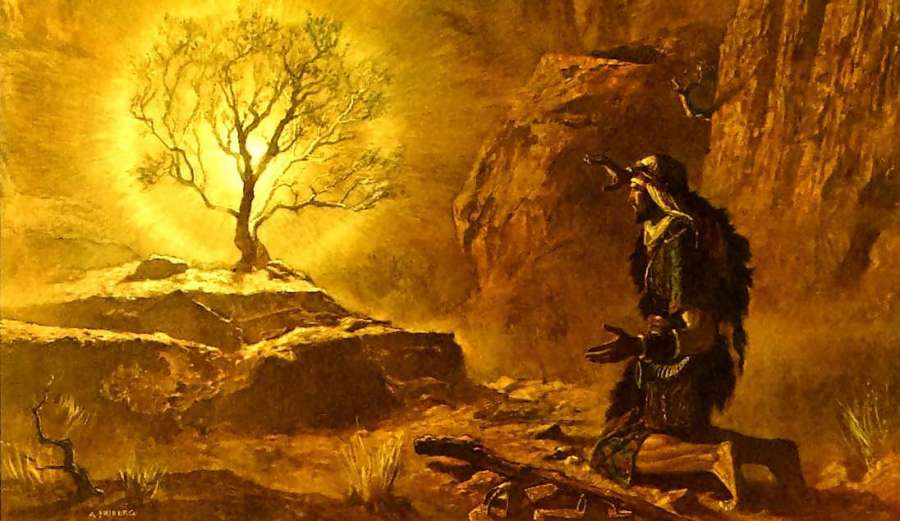
The burning bush ... and God's command to Moses to return to Egypt to lead his Hebrew people out of bondage
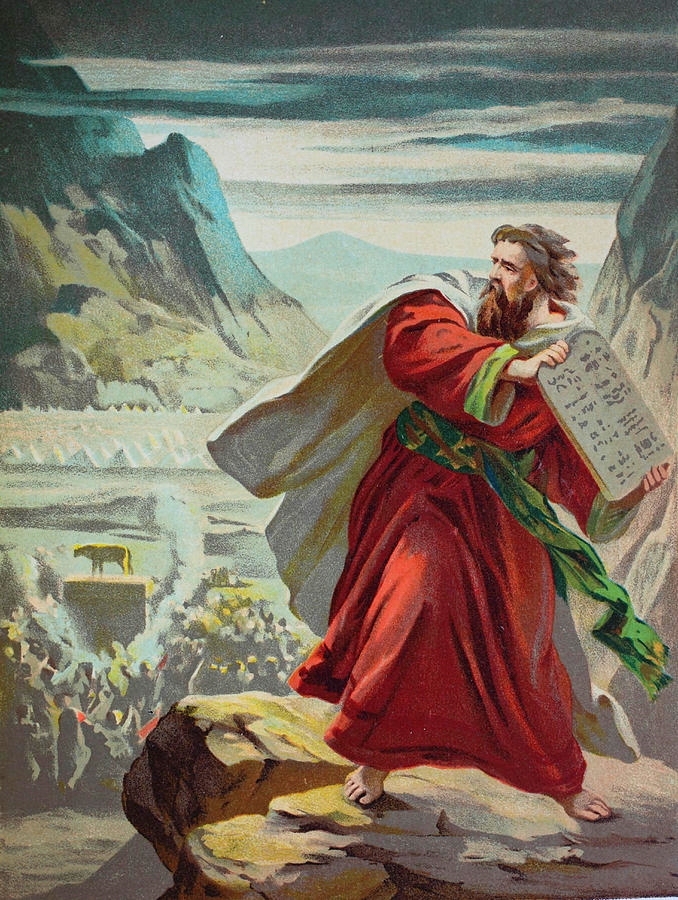
A furious Moses smashes the Stone Tablets of God's Law ... when he discovers that his people have constructed a Golden Calf to worship during
Moses's absence on the mountain (there to receive this Law from God)
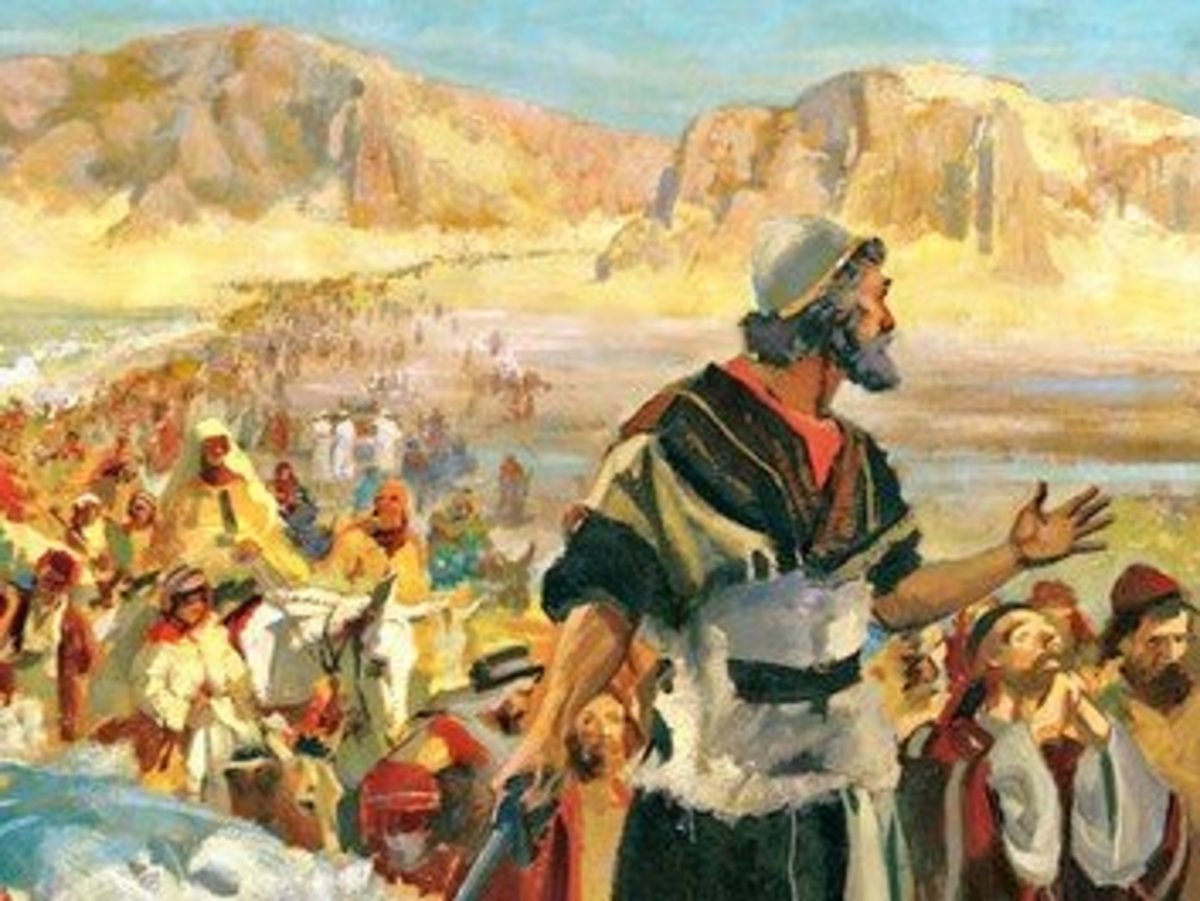
Joshua leads the Hebrews into the Promised Land
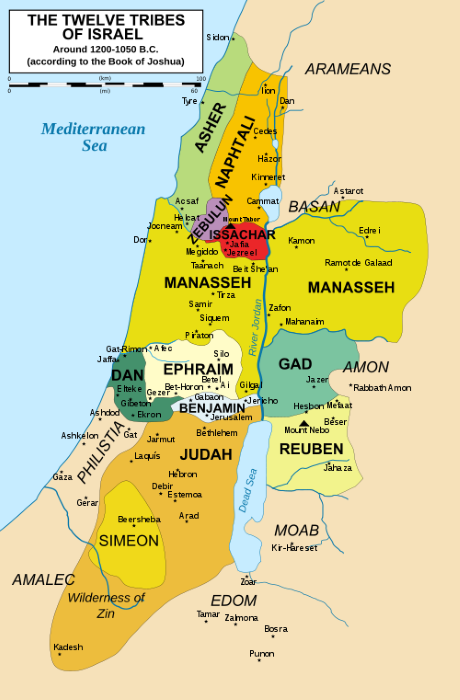
But
by the year 1000 BC, the Israelites were becoming very envious of the
surrounding kingdoms … and began to demand of their spiritual leader,
the prophet (and Israel's last "judge") Samuel, to appoint them a
king. Samuel warned them that to do so would cause them to lose
their liberties and merely produce a very heavy political load to
carry. But they insisted … and so Samuel bowed to their wishes
and had the very popular Saul anointed Israel's first king … although
earlier he had followed God's instructions and prophesied that one day
the young shepherd David, would lead God's people, the Israelites. And
very soon, still the youth that he was, he astonished Israel (and his
older brothers) by coming out to take up the challenge by the
Philistine monster Goliath to meet in personal combat … and bring down
the mighty Goliath – strictly on the basis of David's faith that God
was fully with him in this most dangerous enterprise.
This brought David both political appointment and public adoration –
that he had to carefully navigate in the presence of an increasingly
jealous Saul … until it was time for David to flee Saul's wrath.
In his exile, he twice rejected the opportunity to kill Saul when the
latter was off guard … understanding that his destiny was to come at
the moment of God's choosing, not his own. And that would finally
come when Saul, overstepped his authority, took on Samuel's priestly
powers for himself in preparation for a huge battle, and suffered the
consequences of his own death and his son Jonathan's in the battle as a
result. David now stepped into the kingship.
But even David got caught up in the pride of power when he took for his
own sexual pleasure the wife of a very faithful military officer of
his, Bathsheba … and made her pregnant. The betrayal was
discovered by the prophet Nathan, who brought David to repentance … but
still could not rescue David from the consequences of his action.5
The baby did not survive, though David went on to have a second son by
Bathsheba, Solomon … who would actually go on to become a great
king. But he would have horrible troubles from his other
sons, Amnon and Absalom … and die a brokenhearted king.
But Solomon would bring Israel and its Judaic capital Jerusalem to
political greatness … expanding considerably the realm of the kingdom,
and through diplomatic alliances, the political reach of Israel to the
nations around them. But in doing so, he would dilute greatly the
position of Yahweh in the scheme of things … building a fabulous temple
to Yahweh … but also other temples dedicated to the gods of his various
foreigner wives (hundreds of them!). Thus David's political
simplicity and directness was replaced by Solomon's highly
sophisticated but also highly complex political programming … which in
his later years a fairly wise Solomon realized was just thin
appearances and not deep reality. Indeed, his reflections on
these matters became the foundations for what was to become the
expanded "wisdom literature" of later Judaism (Proverbs, Ecclesiastes,
Song of Solomon, etc.).
5Muslims,
however, claim that this story of David and Bathsheba is told
falsely. David was one of the true prophets and thus
characterized by the principle of ismah (infallibility). He could not have done this. Thus Jews and Christians who tell the story as they do are guilty of qazf (falsely accusing a person of adultery) and defaming a prophet, two huge crimes in the eyes of Islam.
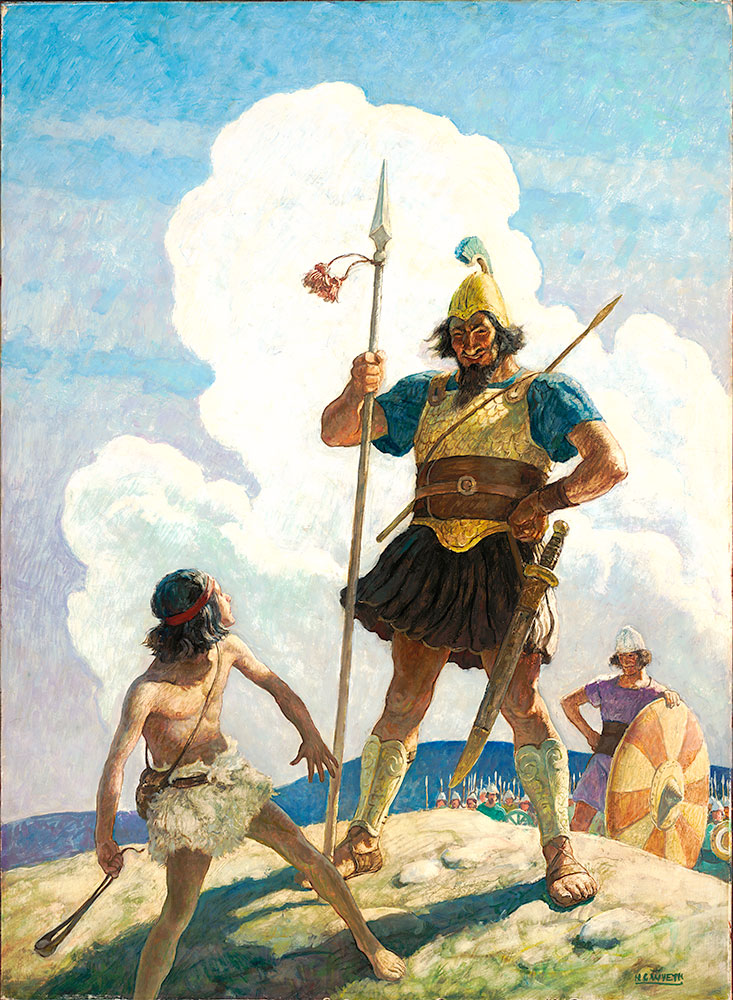
A young David saves Israel by killing the giant Goliath in a contest with the Philistines
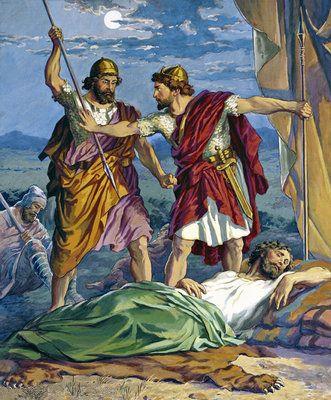
David, fleeing with his men from a jealous King Saul, spares Saul when he finds Saul asleep.
David will accept Israeli leadership only through the hand of God ... not man!
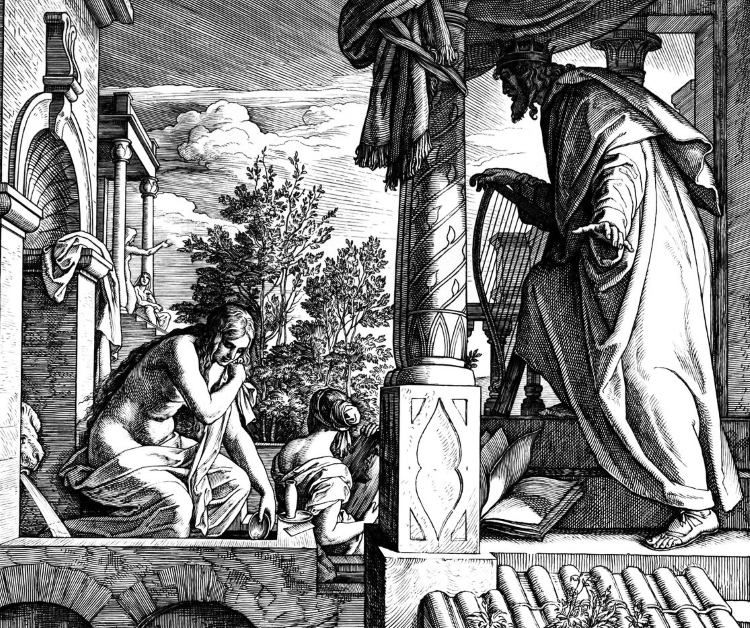
Fully empowerd as Israel's king ... David lets his power go to his head and seduces the wife of a very loyal miliary officer when the latter is away fighting for Israel
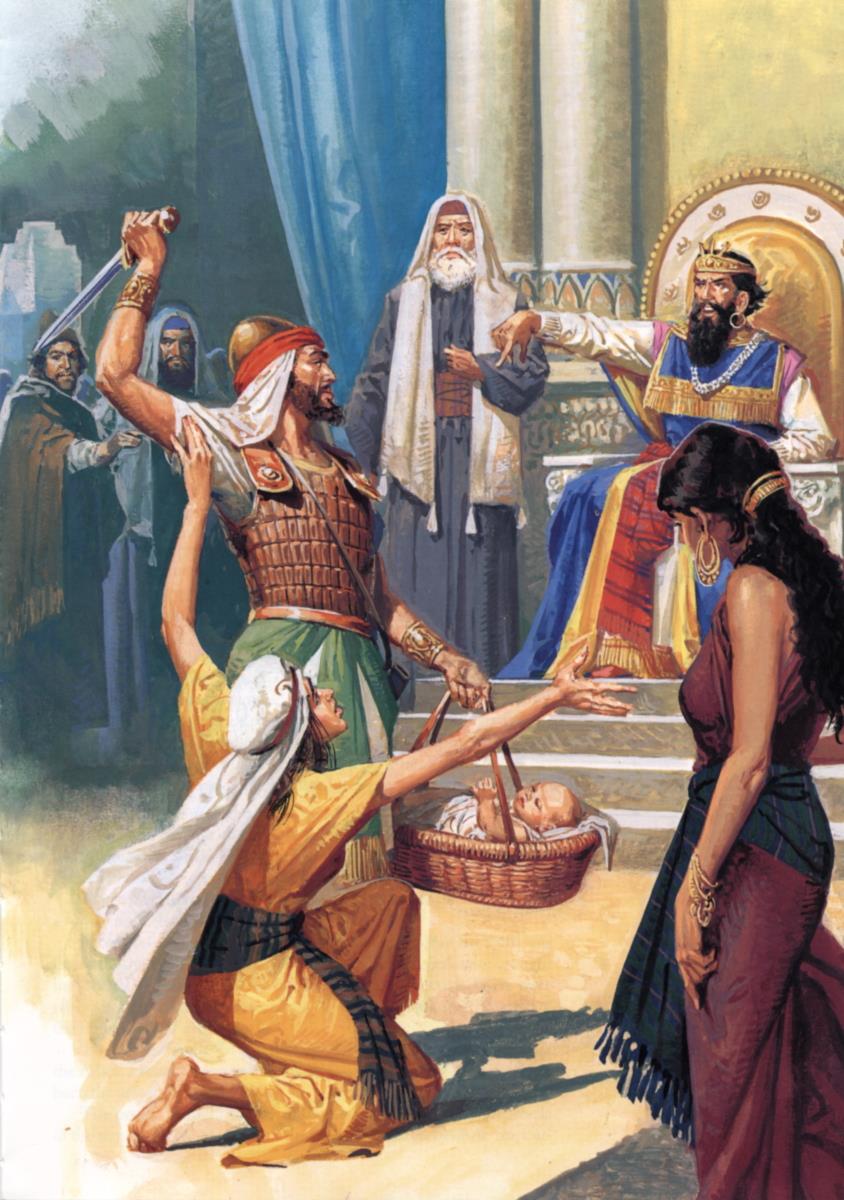
Solomon is recognized for his wisdom in the way he resolved a conflct between two women over a baby
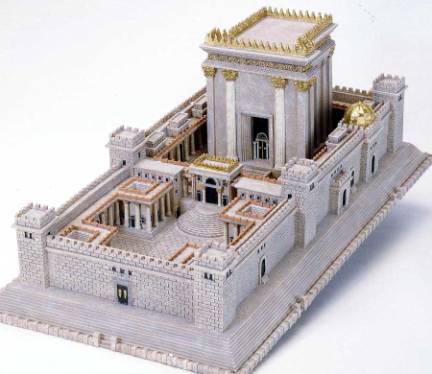
Solomon's Temple to YHWH
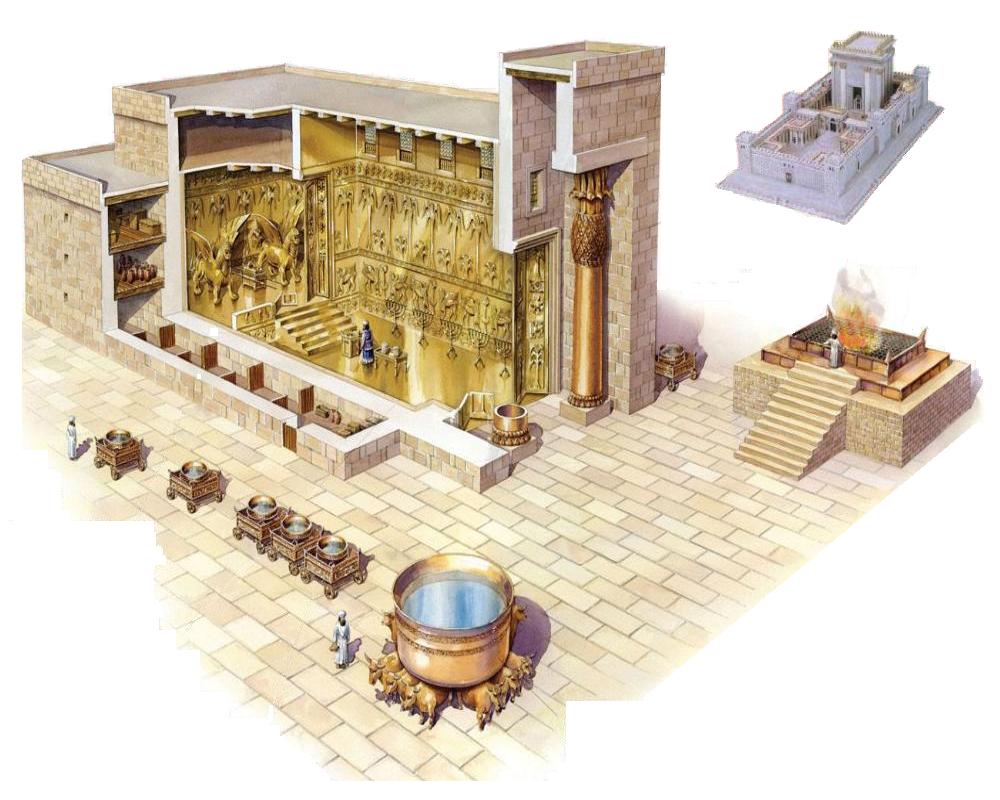
A cutaway view of the Temple
|
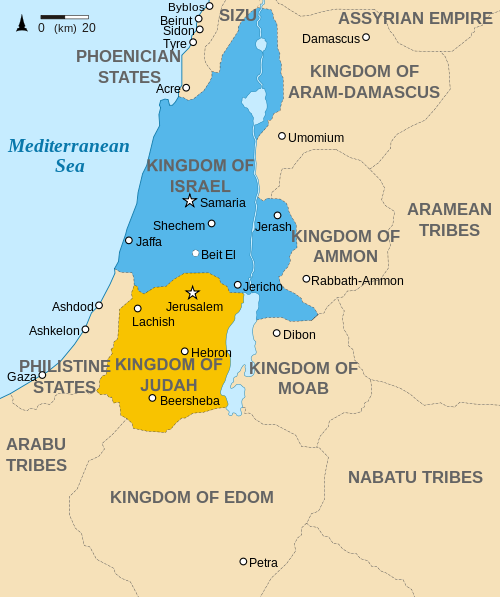
Israel-Judah around 830 BC
Wikimedia Commons
Division and decline
The North-South split.
After Solomon, the Davidic kingdom split between Solomon’s son,
Rehoboam, and the Israeli General Jeroboam. The larger and much
wealthier northern portion, which Jeroboam set up as an independent
kingdom, would continue to enjoy the use of the name Israel, and
construct smaller temples at Bethel (the original Israelite worship
center) and at Dan ... and locate its capital at Samaria.
The
Southern portion would be known from that point on as Judah (from the
southern tribal region it was largely built on) with its Davidic
Capital and Temple still at Jerusalem.
The two Hebrew states often fought – or sometimes allied with each other
– usually in response to what was going on around them in Egypt, Syria
and Mesopotamia (Iraq). They continued to act as if they were the
major power they had become under Solomon ... though Judah tended to be
a bit more realistic about this than Israel and thus a bit more
cautious in its diplomatic and military diplomacy.
Perhaps because of the location of the Temple in Judah at Jerusalem –
and the strong influence of the Zadokite (Greek: "Sadducee") priesthood
there – Judah stay more closely in line with its religious focus on
YHWH ... whereas the Israelite kings tended to be more "inclusive" –
(much like Solomon had been) in erecting temples to even the Canaanite
gods.
Ahab, Jezebel, Elijah and Elisha.
This became especially the case when King Ahab (r. 871-852 BC), in his bid to widen the
power of Israel, married the Phoenician princess Jezebel. But she
in turn brought her priests of Baal and Asherah with her to Israel –
and set about killing whatever Yahwist priests she could get her hands
on.
Finally she and her prophets of Baal were challenged by the bold
Yahwist prophet Elijah – resulting in the humiliation and subsequent
slaughter of the priests of Baal ... and also Asherah.6
King Ahab
subsequently died in battle, was succeeded by his sons Ahaziah and then
Jehoram.
But Jehoram was challenged by the Israelite General Jehu, whom the
prophet Elisha (Elijah’s successor) had anointed as the new king.
Then Jehu (under Elisha’s instructions) set about purging Israel of the
family line of Ahab-Jezebel – including Jezebel herself, who was thrown
from her palace window to dogs below.
Meanwhile
Athaliah, daughter of Ahab and Jezebel, had married King
Jehoram of Judah (so many Jehorams!) and also introduced her mother's
Baal worship to Judah. Jehoram’s rule in Judah was generally
catastrophic ... and he and most of his family died at the hands of
Philistine, Arabian and Ethiopian raiders.
Athaliah survived as queen mother ... who when Jehu killed off her
family in Israel then responded by turning on the descendants of David
in Judah, nearly wiping out the entire Davidic line.
Only the baby Jehoash survived when he was hidden from the vengeful
Athaliah. But finally, Athaliah was overthrown and executed ...
and Jehoash (although only seven at the time) crowned as King of
Judah. Jehoash – according to his Yahwist chroniclers –
subsequently gave Judah 40 years of righteous government.
The rise of Assyria ... and the destruction
of the northern kingdom of Israel
In the meantime, a northern Mesopotamian people, the Assyrians had
challenged much of the Middle East with their ruthless military
domination, begun in earnest in the early 800s BC by Ashurnasirpal II
... who conquered cities everywhere, executing or enslaving his
defeated enemies and leveling their cities to the ground. But
eventually the Assyrian danger seemed to subside ... as Assyria
subsequently came under a number of weak rulers.
Then in 745 BC Assyrian general Tiglath-Pileser III seized power and
put Assyria back on the path of dominance through destruction ...
striking terror in the hearts of the people throughout the region.
The kings of Israel and Syria appealed to King Ahaz of Judah to help
them fight the Assyrians ... but Ahaz refused (Judah’s relations with
both countries had not been good, especially with the Syrians), and
Israel and Syria foolishly attacked Judah upon Ahaz’s refusal.
But equally foolishly, King Ahaz put himself at the mercy of
Tiglath-Pileser and appealed to him to come to his aid against Syria
and Israel ... which Assyria immediately did, in 732 BC crushing both
Syria and Israel – and placing them also under Assyrian control.
Then King Hoshea of Israel stopped paying tribute to Assyria (and its
next King Shalmaneser) and instead appealed to Egypt for help ... which
naturally infuriated the Assyrians, who laid siege to the Israelite
capital-city Samaria for three years. The Assyrians finally
(724/723 BC?) captured the city and carried off to captivity the
inhabitants of all ten northern tribes of Israel.
The Israelites would be scattered widely across the Assyrian
Empire, soon lose their identity as YHWH’s people (not that they had
been that loyal to him in the first place) and neither they nor any of
their descendants would ever return again to the land of
Israel. In their place the Assyrians brought in various
other subject peoples from around their vast empire and settled them in
the vacated Israelite territory ... thus creating the "Samaritans" –
who took up some of the religious ways of the Israelites who had once
lived there, but were themselves not descendants of Abraham nor
possessing any part of the all-important Israelite tribal lineage.
Thus it was that the Kingdom of Israel simply disappeared. About
all that was left of the "true" covenant people of Abraham or Israel at
this point was the southern tribe or kingdom of Judah ... that is, the
land of the "Jews." Judah and Israel were now one and the same
thing.
Now it’s Judah’s turn
Hezekiah and Isaiah.
Nonetheless, Judah itself was not free of the Assyrian threat … which
under a new Assyrian King Sennacherib (ruled 705-681 BC), overran
Judah. Sennacherib then sent an emissary to King Hezekiah at
Jerusalem, demanding massive tribute in silver and gold … and warned
Hezekiah in front of his own people of what the Assyrians would do to
him (and his people) if he were to continue to rely on Egypt for
help. He even scorned them with the claim that their God YHWH was
not in a position to protect them.
But the prophet Isaiah informed Hezekiah (who had always been amazingly
faithful to YHWH – and him alone) that indeed YHWH would actually make
short work of Assyria because of its arrogance … and as a sign, Judah
would revive immediately from the devastation caused by Assyria.
And indeed, this happened when Sennacherib’s own sons assassinated
their father … seriously weakening Assyria in the face of a rising
regional power centered on the ancient city of Babylon … thus a rising
"Babylonian" power.7
In 626 BC under Nabopolassar, these "Babylonians" had secured their
independence from the greatly weakened Assyrian power to the
North. This then also became the opportunity for Egypt, Syria and
others to try to secure their own independence – in various alliances
with each other.
Judah defeated by the Babylonians.
But eventually Judah too got caught up in the politics of the bigger
players – especially as the regional power structure seemed so
undetermined. But most tragically for Judah, step by step, things
went from bad to worse – as Judah got caught up in the middle of an
Egyptian-versus-Babylonian contest. Ultimately, in 597 BC, an
angry Babylonian king Nebuchadnezzar assaulted and conquered the Jews
at Jerusalem … consequently carting off the Judaic royal court, high
priests and upper classes to Babylon as hostages.
But not long thereafter (ten years) – against the warnings of the
prophet Jeremiah not to do so – Judah's king Zedekiah joined with the
Egyptians in a revolt against Babylon. But this merely led
Nebuchadnezzar to again attack Jerusalem (587 BC) … this time
destroying the Temple, tearing down Jerusalem's walls, burning the city
to the ground, and carting off another – but now quite huge – group of
the citizens of Judah (possibly as many as 20,000) to captivity in
Babylon.
6Sadly,
the enormous courage of the prophet Elijah would give way to deep fear
– and Elijah's flight into the desert – in the face of Jezebel's death
threats aimed at Elijah for what he had done to her priests, a Biblical
lesson in spiritual dynamics, demonstrating that true spiritual courage
comes directly as a gift from God – and not from well-designed human
intentions.
7These
Babylonians were actually "neo-Babylonians," for they had no connection
with the Babylonian Empire built up by the great Hammurabi about
twelve-hundred years earlier – other than both having the city of
Babylon serve as their capital-cities.
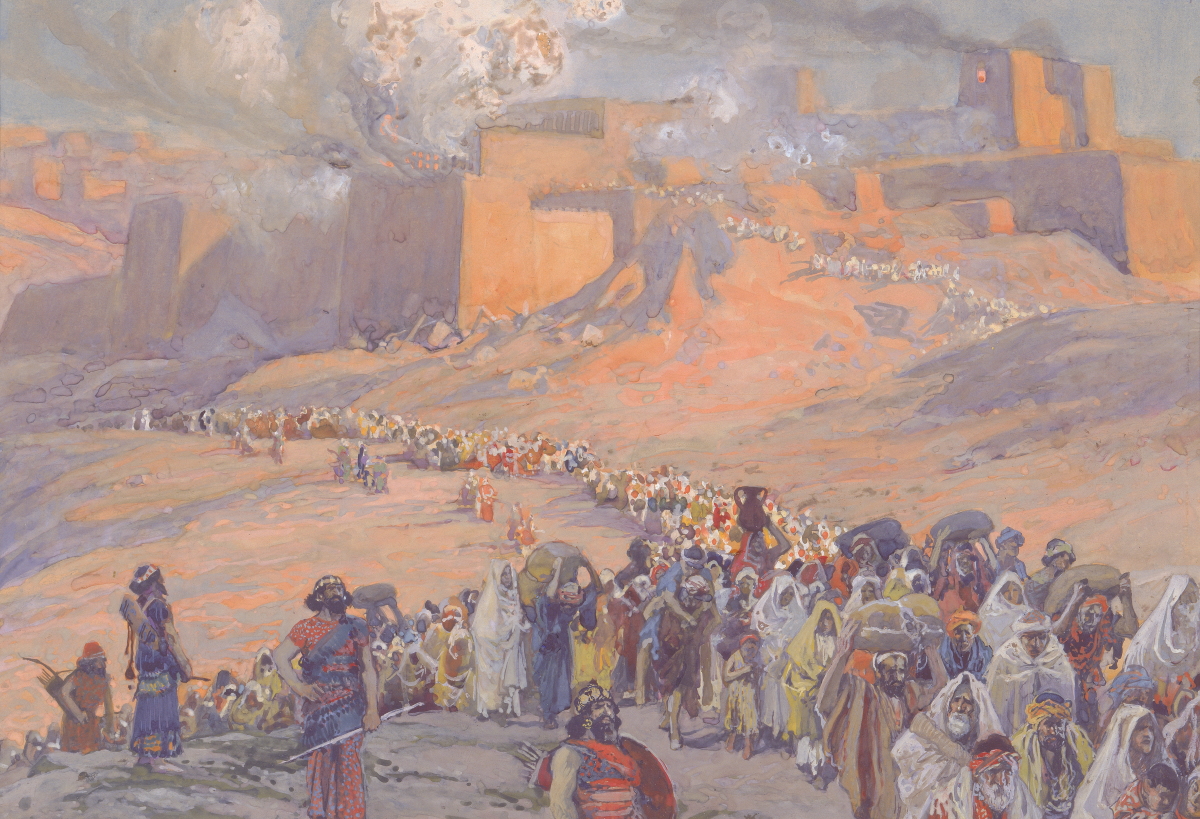
The Jews being led into captivity at Babylon (in two waves - early 500s BC)
THE "BABYLONIAN CAPTIVITY" ... AND ITS LEGACY |
Judaism is born in Babylon.
Thankfully, the Jews were not scattered around the Babylonian kingdom
as the Assyrians had done to the Israelites. The Jews were
allowed to live in Babylon in their own communities … where they
actually would come to prosper. But therein was a huge danger –
that of losing their offspring to Babylonian culture. But what
were they to do as Jews? There was now no Temple where they could
bring their sacrifices to the priests in accordance with Jewish
tradition. In fact, the priestly class, the Levites, were rather
unemployed in Babylon.
But what they did have was their strong religious traditions … and most
importantly, their own Jewish narrative, the Mishnah, as a chosen
people to inspire them. Thus they gathered on a regular basis,
the Shabbat, to "worship" … prayers, songs, even dances, being offered
in Jewish worship at these gathering centers or synagogues. But
most importantly, as something like sermons, they were told and retold
the stories of the Mishnah by their elders or teachers (eventually
"rabbis") … narratives about their ancestors which they began to gather
carefully … thus beginning the assembly of their Jewish Bible, the
Torah.
Thus it was that they grew as a religious unit, dependent – unlike the
world around them – not on priests and temple sacrifices … but on a
sense that as a people they possessed a very special "Word" from God
about how, as his chosen people, and by the example of their ancestors
before them, they were to live … amidst a "Gentile" (non-Jewish)
world. Thus as a Jewish people they not only survived. They
prospered.
They still had some theological questions that needed to be answered in
all of this. How was it that, as a people of God, they found
themselves captives in Babylon? Was the god of the Babylonians,
Marduk, greater than their god Yahweh? The answer came in the
form of a new understanding that in fact there was only one God
responsible for the creation of the universe … in fact, of all that
there was in life. There was only one god, Yahweh. But he
had to bring the Jews to their present circumstances (as he had done so
many times previously with their ancestors) to get them to see what
exactly he had in mind for his "chosen people" to be doing in this
larger human realm. In a sense, they were brought to Babylon to
be "awakened" from their human political-social obsessions and
consequently be brought into God's higher spiritual realm. Thus
as his "chosen people," they were to serve Yahweh as a priestly
people. As Isaiah put it (Isaiah 49:6), they were to be a "light
unto the nations." They were thus called to bring all humankind to
worship God in Zion … to demonstrate to the larger world how to "walk
in His ways" (Psalm 128:1).
Rebuilding life in the Promised Land.
When in 539 BC, the Persians – under the rule of King Cyrus – overran
the Babylonians, Cyrus allowed the captive nations, including the Jews,
to return to their homelands … if they chose to return. In fact
only a portion of the Jewish community in Babylon found their way back
to their Jewish homeland … although even then, the group that returned
was reported to number over 40,000 – although it is believed today that
this did not occur as a single event, but involved a continuing
movement of such returnees over the years. Indeed, a second great
migration occurred almost a century later under the direction of the
prophets Ezra and Nehemiah.
Yet at the same time, most Jews chose to remain in the city of Babylon
– where life there was fairly comfortable and where their community
structure and its unity was generally under no deep danger (some
exceptional occasions however).
In any case, on their return to the Promised Land, these returnee Jews
encountered a much-changed Judah – even though only the oldest of this
group were able to remember what life in Judah was like before they
were carted off to Babylon. The local population that had
been left behind in Judah had, over the leaderless years, wandered from
their Jewish religious-political ways – and did not recognize any
special relationship with the returning Jews. Coupled with the
fact that the Assyrian program of resettling foreigners in the lands
they had conquered had also filled the land with "Samaritans" – there
was actually considerable local hostility aimed at these returnees.
The first order of the day for the returned Jews was to rebuild,
under the direction of Zerubbabel, the Temple as
a matter of great importance. It would take some 20 years – with some serious disruptions in the process – to complete the
build. And sadly for those able to remember the original Temple
before its destruction by the Babylonians, this reconstructed Second
Temple fell way short of the grandeur of the First or Solomon's Temple.
Eventually, the Jews
then looked to the second order of the day, the rebuilding of the walls
of Jerusalem (under the direction of Nehemiah) ... in very short order
in 445 BC.
Rabbinical Judaism continues. Yet even with the Temple rebuilt in Jerusalem and the sacrifices
commenced again under the direction of the restored temple priesthood,
the rabbis or teachers continued to operate much as they had in
Babylon. Not only in Jerusalem but also in the various towns of the
rest of restored Judah/Israel, the rabbis continued to preserve their
Biblical scholarship as a major undergirding of the Jewish
nation. Jews would visit Jerusalem on very special religious
occasions. But their Jewish faith and social-spiritual life was
actually built on their involvement with the local synagogue, where
they gathered on a regular weekly basis, the Shabbat or Sabbath, to
follow closely their rabbi's teachings or sermons – giving powerful
social structure to their lives.
The Jewish "diaspora."
But as already noted, the majority of the Jews however opted to remain
in Babylon, where life was good, and their Jewish religious life was in
no danger of being extinguished in doing so. And thus began the
Jewish "diaspora" … the reality that Jews required no particular
homeland to identify themselves by … though certainly Judea and its
capital Jerusalem still held special interest to them as a
people. But what ultimately identified them was their lives built
around the Sabbath practice of regular worship, instruction, fellowship
… and a set of social-moral rules to live by – and be identified by as
a distinct people. And this would take place not only in Babylon
… but among the huge number of Jews living in Egypt.
Earlier, many Jews had accompanied the prophet Jeremiah to Egypt
rather than face the Babylonian captivity – and then when the
Alexandrians took over Egypt and made Alexandria a spectacular city,
many more Jews found good reason to choose to live there. It was
a great place to live out Jewish life. It was after all the Greek
Ptolemies of Egypt that had offered them the invaluable gift of
translating their Torah into Greek … allowing them to fit easily into
Egyptian society – and retain their strong Jewish identities.
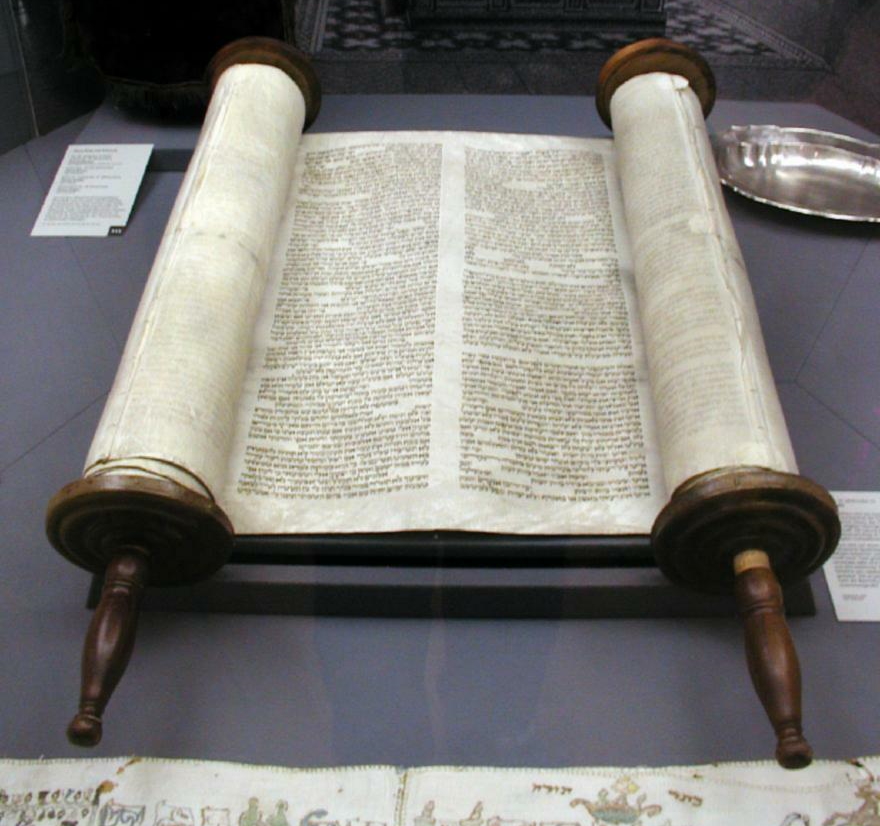
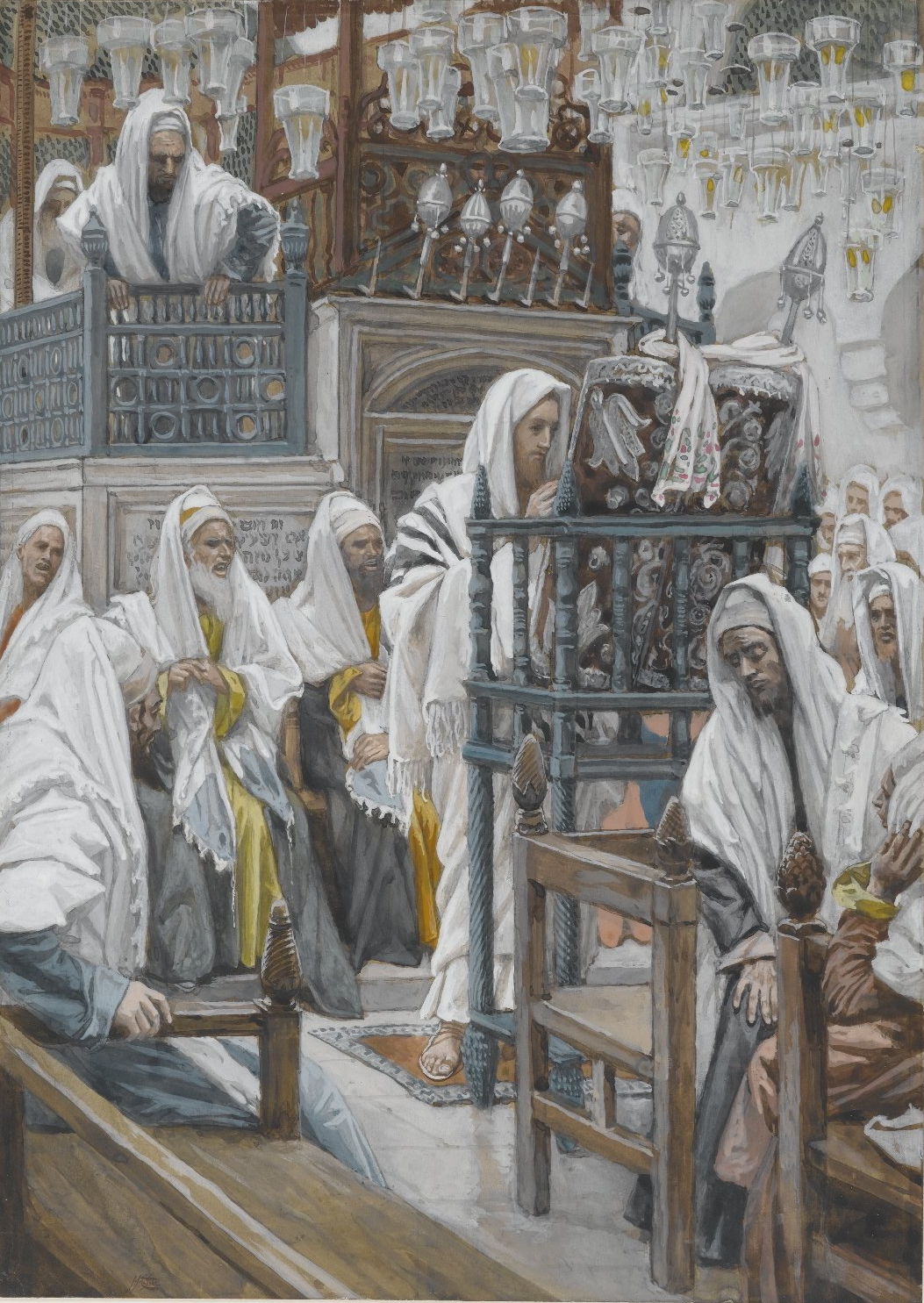
The reading of and commentary on the Torah (the "sermon") ... actually a picture of Jesus doing this in his day
FURTHER DEVELOPMENTS IN JUDEA |
With
the coming of the Greeks by way of Alexander's conquests of the lands
of the Eastern Mediterranean, Judah or Israel as it tended to call
itself, found Greek culture becoming deeply invasive of its traditional
Jewish culture ... especially among the rising generations.
Indeed, Greek views on sex were deeply shocking to Jewish sensitivities.
Nonetheless, Greek culture was making deep inroads into Jewish culture
... even becoming the preferred language of scholarship - although
ancient Hebrew remained central to Jewish worship. But the two
worlds of scholarship and worship were becoming rather separate.
Then with the arrival of the Romans to the region in the 100s BC,
Jewish culture feared an even deeper absorption into "Gentile"
(non-Jewish) ways. Thus a spirit of rebellion found itself
growing among many (though by no means all) of the Jewish people.
They needed an Anointed One, a Messiah, to deliver them from this
Gentile bondage.
The Maccabean resistance to Hellenism
Antiochus IV "Epiphanes" (r. 175-164 BC).
Within the larger Greek Seleucid realm – which included the Jewish
lands of Judea and Galilee – when Seleucid King Antiochus III died in
187 BC, he was eventually (175 BC) succeeded by his son Antiochus IV
... a truly insane individual who called himself "Epiphanes" ("God in
appearance"). Nonetheless, being very ambitious, Antiochus was
able to take control of the neighboring – and much-weakened – Ptolemaic
Egypt in 170 BC … but found the Romans blocking his attempt two years
later to firm up his control there.
This political failure of Antiochus's in Egypt delivered by the Romans
was interpreted in Judea as a sign of serious Seleucid weakness … which
in turn inspired in Judea a political reaction ... one which expelled
the Seleucid appointed (and very Hellenistic or pro-Greek) high priest,
Menelaus. This act then angered Antiochus in his return from
Egypt (168 BC) to the point of attacking, pillaging and slaughtering
Jerusalem and its inhabitants (carrying off 10,000 survivors as
prisoners) ... and supporting the party of the Hellenized Jews
(who had adopted Greek culture and its very un-Jewish ways) by
suppressing the religious culture and practices of orthodox
Judaism.
The Maccabean Revolt.
Then Antiochus rededicated the Temple to himself and forced the Jews to
perform sacrifices to him personally, burning or crucifying those that
refused.
In 167 BC, Jewish priest Mattathias refused, in fact killed a Jew who
was about to offer just such a sacrifice ... and then did the same to
the Seleucid general supervising the event. He and his sons then
fled to the mountains ... and there began to gather a following of Jews
ready to face martyrdom in defending Judaism from the intrusion of
Greek pagan culture into their homeland.
The rebels under the leadership of Mattathias's son Judah "Maccabee" (the "Hammer")8
were finally able in 164 BC to take Jerusalem ... and cleanse the
Jewish temple of the Greek statues and adornments (the event celebrated
as Hanukkah) – the first step towards a growing independence from
Seleucid authority. This revolt then spread quickly around much
of the region of old Judea – aimed as much against Hellenized Jews as
against Seleucid authority itself.
But Seleucid General Nicanor was able to retake Jerusalem ... and then
lose it again to Judah Maccabee – who executed Nicanor. But once
more, the Seleucids made a comeback and Judah and a small group of
followers who had not deserted the cause were defeated (Judah actually
killed) in 160 BC.
Jonathan and Simon.
However, the ongoing dynastic rivalry within the Seleucid dynasty once
again offered opportunity to the Maccabees (now under brother Jonathan)
to overwhelm the Jewish Hellenized party ... and take and rebuild
Jerusalem, cleanse its Temple – and restore conservative Judaism. But
at the same time, clever political maneuvering by Jonathan resulted
eventually actually in his Seleucid appointment as Jewish High Priest
(153 BC) ... the Seleucids, most strangely, even promising him
protection against the Hellenized Jews. Then in 150 BC Jonathan
was in effect made governor of Judea.
But the civil strife between the Hellenized and Orthodox Jewish parties
continued … with Jonathan gaining ground for the Orthodox Jews.
In 145 BC Jonathan saw the opportunity to press forward politically
even more – because of a dispute involving both the Ptolemies and the
Seleucids. But in 143 BC Jonathan was drawn into a Seleucid
diplomatic trap, imprisoned (soon executed), and his army destroyed.
At this point, Jonathan's brother Simon took over the Orthodox cause
... and in 141 BC the Hasmonean family was officially recognized by a
Jewish assembly as the rightful rulers of Judea. Two years later
the Roman Senate confirmed that decision. Judea was now officially an
independent kingdom.
This official status however did not exempt Judea from involvement in
the dynastic struggles of the Ptolemies and Seleucids ... or the
interests of the expanding Roman Empire ... or their own dynastic
conflicts. The Hasmoneans themselves got caught up in much of the
military and diplomatic maneuvering that would go on for another
century.
John Hyrcanus (r. 134-104 BC).
In 134 BC Simon was assassinated by a son-in-law at a banquet ... and
nearly all his family executed. Only Simon's son John (Yohanan)
escaped the slaughter ... and would eventually make a comeback as a
conqueror (and High Priest) ... and also as a clever diplomat playing on
the difficulties of the Greeks caught up in their continuing dynastic
rivalries, plus both the rising power of Parthians (Persians) to the
East and Romans to the West. By allying with the Egyptian
Ptolemies and the Romans, John was able to extend his Jewish kingdom's
boundaries considerably (earning him the title "Hyrcanus"9)
... at the same time rebuilding the defenses of Jerusalem. Also,
as High Priest, he relaxed some of the strict rules of Judaism ... in
opposition to the Pharisees – and in support of the more "pragmatic"
(or secularist) Sadducees.
The last days of the Maccabees (or Hasmoneans)
When
John Hyrcanus died in 104 BC, the behavior of his sons revealed
clearly how much Greek culture had made its way into Jewish
culture. Aristobulus, after imprisoning his mother and three
brothers, declared himself Jewish king (unacceptable to the Pharisees
because he was not of Davidic lineage). His wife Salome Alexandra
then convinced him that the one brother he favored, Antigonus, was
conspiring against him and he had him murdered ... and then he himself
immediately fell ill and died – only one year into his reign.
Salome then (103 BC) released the remaining brothers from prison and
placed his brother Alexander Jannaeus on the Jewish throne ... soon
becoming even his wife.
However, although Salome was a supporter of the Pharisee party, Alexander hated them. The Pharisees were very
critical of his sadistic and cowardly behavior and his use of Greek
mercenaries, which in 93 BC he turned on his people, slaughtering
thousands. But this served only to undercut his own rule – even
forcing him to flee to the Judean hills. But he regained his
throne ... and once again turned on his people, killing thousands of
them over a devastating six-year civil war. At one point he was
even able to enjoy having his crucified enemies being forced to
watch their wives and children being slaughtered prior to their own
deaths.
His ferocious personality however did bring considerable expansion to
the kingdom of Judea ... before he himself died of alcoholism in 76
BC. At this point, Salome again took charge ... and in the nine
remaining years of her life finally brought both peace and economic
development to the kingdom ... as well as the advancement of the
Pharisee party.
The Hasmonean Civil War ... and the arrival of the Romans.
With her death in 67 BC, the intense rivalry between the "modernizing"
Sadducees and the conservative Pharisees took the form of a bitter war
between Salome's two sons, the older brother Hyrcanus II, who stepped
up as King and High Priest – and supporter of the Pharisee party – and
his younger brother Aristobulus II, supporting the Sadducees … and far
more popular among the people.
The feuding Jews appealed to the Roman general and political leader
Pompey to help them sort out their civil war. Pompey eventually
moved strongly against Aristobulus and his Sadducee supporters when the
latter foolishly turned against Pompey. Pompey's forces attacked
Jerusalem, destroying its walls and massacring much of the population
inside. Pompey then formally ended the Hasmonean monarchy, but at
least confirmed Hyrcanus as Jewish Chief Priest ... and Hyrcanus's
Idumaean ally, Antipater, as governor of the recently Judaized Edomites
or Idumaeans. And then Pompey returned to Rome.
The rise of the Herodians
The Edomite governor Antipater proved to be a skilled political
maneuverer and eventually chose to support Julius Caesar in his war
with Pompey. Consequently, in 47 BC, Antipater was given the
position of Roman procurator of Judea by Caesar. And Antipater in
turn named his sons Herod governor of Galilee (the Judean north) and
Phasael governor of Jerusalem (the Judean south).
But when Caesar was assassinated in 44 BC, the new Roman ruler in the
East, Cassius, forced the payment of tribute to Rome so heavy that it
plunged the Jews into poverty. Antipater's official collector of
the tribute, Malichus, was so enraged by his duties (but also
personally ambitious) that the following year he had Antipater poisoned.
But in agreement with Caesar's successor, Octavian Caesar, Octavian's
friend Marc Antony was assigned the Eastern half of the Roman Empire
... and Antony in turn in 41 BC awarded Antipater's sons Herod and
Phasael the rank of tetrarch in their two jurisdictions (Galilee and
Jerusalem).
Herod. When in 40
BC Parthians from the east of the Seleucid Empire raided west all the
way to the Mediterranean Sea, the Herodians were deposed and the
Hasmonean Antigonus was appointed by the Parthians as Judean king.
But now the Hasmonean Antigonus (grandson of Salome) made an attempt to
gain the throne against Herod and Phasael, calling on Parthian support
in the endeavor … the Parthians bringing a huge army to Jerusalem in 40
BC. Tragically, Phaseal was lured into negotiations with the
Parthians over the matter, but was seized … and then killed himself.
But Herod escaped to Rome and convinced the Senate to support him in
his effort to overthrow the pro-Parthian Hasmoneans. With
considerable Roman help, it took him until 37 BC (or 36 BC) to take
full command of Judea ... before beginning 34 years of rule as Judean
King (under Roman sponsorship).
In those years he would rebuild Jerusalem extensively ... including its
walls (that Pompey had destroyed). But most importantly, he would
construct a new and much grander Jewish Temple and Temple Mount.
This would please the people ... though his taxes needed to pay for
these projects did not. In the end, the people's view of Herod
weighed strongly to the negative side ... despite his efforts to show
himself to be a strong supporter of Judaism. His dependency on
Roman power did not help his standing with the people ... nor did his
reputation for cruelty (to even his immediate family).
Herod would die in 4 BC (or 3 BC?) ... soon after a calendar-changing event occurred: the birth of Jesus in Bethlehem.
8The Hasmonean family or dynasty would be known
popularly as the "Maccabees" after Judah took the lead in the family.
9It is not clear today what exactly that title
meant!
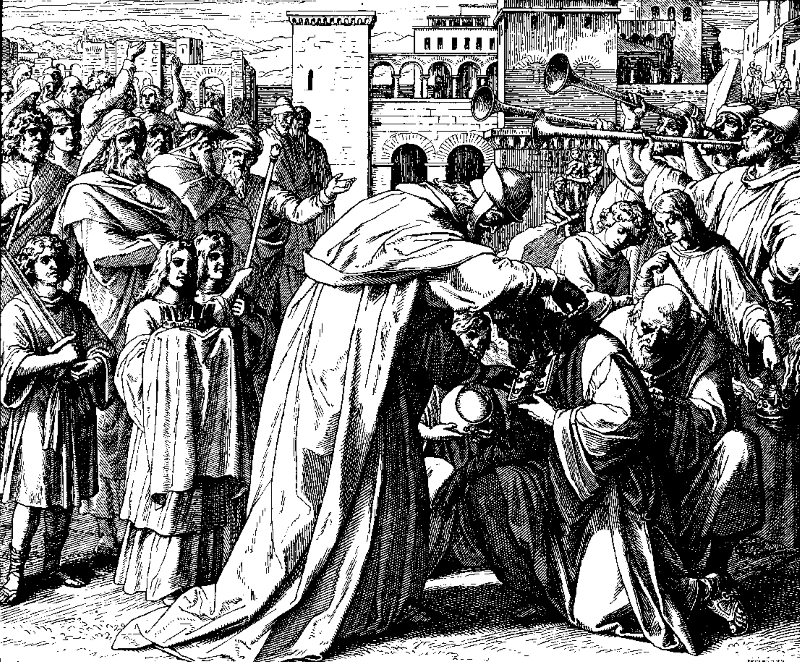
Simeon Maccabee being anointed (Greek style) as both Jewish High Priest and King - 143 BC
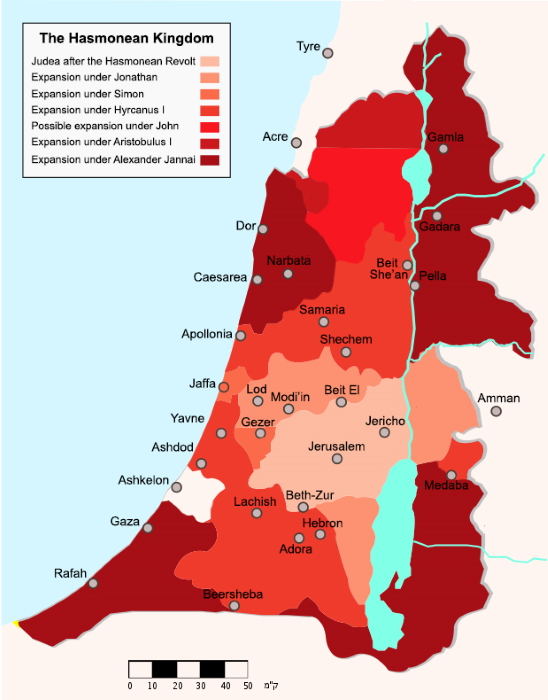

Go on to the next section: The Formation of Christendom
 Miles
H. Hodges Miles
H. Hodges
| | | | |


 Israel as the "Light to the Nations"
Israel as the "Light to the Nations"
 The early foundations of the Covenant People
The early foundations of the Covenant People
 The "Babylonian Captivity" ... and its legacy
The "Babylonian Captivity" ... and its legacy
























